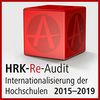10.07.2017 | Student industrial projects
Immersive VR systems in Digital Factory Planning
Project presentations of the Master Operations Management
Daniel Czilwik Chaves / Daniel Schadhauser
Students of the ESB Business School's Operations Management Master's programme work on practical projects in production and logistics in cooperation with industrial companies and research institutes. The project results of this semester were presented last Thursday. In addition to the supervising professors, many representatives of companies and research institutes followed the presentations and visited the poster sessions.
The projects, which in the last semester were worked on by teams of about eight students on two days a week, were dedicated to three thematic blocks:
Topic block 1: Virtual Reality (VR) and Industry 4.0
One team dealt with the use of immersive VR systems in digital factory planning in the Virtual Engineering and Training Center (VETC) of the ESB Business School. The team developed a process model with different application scenarios. These were implemented with VR systems in the VETC laboratory. In cooperation with the Fraunhofer Institute for Industrial Engineering in Stuttgart, another team investigated when the use of VR in workplace design makes sense compared to cardboard engineering. Companies now have an evaluation model available to help them make this decision. In the project in the ESB logistics learning factory, the students developed approaches and methods for the realization of industry 4.0 factories. Based on the daily order situation and the available resources in the factory, proposals were made for an optimal production system with factory layout and processes. The result can be displayed in the factory using data glasses and augmented reality and the implementation can be checked.
Topic block 2: Digitalization in the company
A project team was engaged in the design and implementation of a supplier portal for order management for the company Fabrikado. fabrikado.com is a supplier-independent internet platform for ordering, production and delivery of components. Another project team was dedicated to the topic "Data management for the error-free creation of assembly documents" at SINGLE Temperiertechnik GmbH. Here, the company's design processes were analyzed and optimized with regard to the error rate. By implementing an extension to product data management, error-free, customer-specific assembly documents can now be created. Another project team dealt with the challenges faced by established companies through innovative start-ups. A model for the analysis and evaluation of start-ups that can be applied across all industries was developed and applied to start-ups in the insurance sector in cooperation with the Süddeutsche Krankenversicherung.
Topic block 3: Logistics optimisation
This block of topics covered logistics optimization at SINGLE and H. Stoll AG & Co. KG. One group selected a new warehouse management system and optimized the logistics processes in preparation for the system introduction. At Stoll, a detailed analysis of the current situation revealed a number of potential improvements in logistics. As an example, the booking process for delivery materials was technologically and organizationally improved.
All research partners and companies agreed that the semester projects are of great benefit to the users. The students were also full of praise: The knowledge and methods learned in the courses and the practical application of these methods not only increase the students' competence to act, but also provide valuable insights into the working world.



![[Translate to English:] Student mit Datenbrille](/fileadmin/_processed_/1/0/csm_Master_Operations_Management_Projektpraesentation_ESB_Business_School_3_0b47a39468.jpg)


![[Translate to English:] Vielfalt gestalten [Translate to English:] Vielfalt gestalten](/fileadmin/_processed_/1/b/csm_vielfalt-gestalten_ada6a17851.png)

![[Translate to English:] Prime [Translate to English:] Prime](/fileadmin/user_upload/prime-logo.png)
![[Translate to English:] Weltoffene Hochschule [Translate to English:] Weltoffene Hochschule](/fileadmin/_processed_/d/7/csm_logo-weltoffene-hochschule_6f9b27df1e.png)